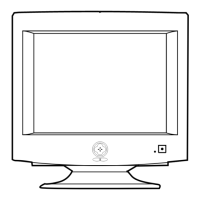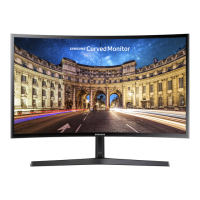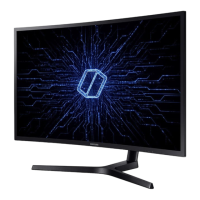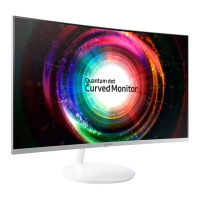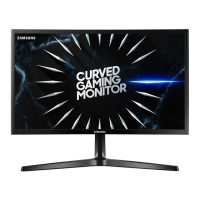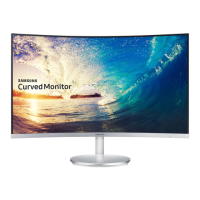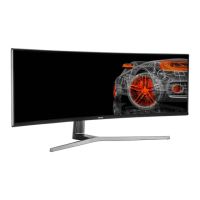6-3-2 (b) VERTICAL LINEARITY ADJUSTMENT
CONDITIONS
Scanning frequency: 60 kHz/75 Hz
Display image: Crosshatch pattern
Brightness: Maximum
Contrast: Maximum
To adjust the Vertical Linearity, refer to Tables 6-1
and 6-2 for the tolerance range.
Click on the << or >> box next to V_LIN to
optimize the image.
6-3-3 Trapezoid Adjustment
CONDITIONS
Scanning frequency: 60 kHz/75 Hz
Display image: Crosshatch pattern
Brightness: Maximum
Contrast: Maximum
Click on the << or >> box next to TRAPE to make
the image area rectangular.
Figure 6-4. Trapezoid
6-3-4 Pinbalance Adjustment
CONDITIONS
Scanning frequency: 60 kHz/75 Hz
Display image: Crosshatch pattern
Brightness: Maximum
Contrast: Maximum
Click on the << or >> box next to PIN_BAL to
optimize the image.
6-3-5 Parallelogram Adjustment
CONDITIONS
Scanning Frequency: 60 kHz/75 Hz
Display image: Crosshatch pattern
Brightness: Maximum
Contrast: Maximum
Click on the << or >> box next to PARALL to
make the image area rectangular.
Figure 6-6. Parallelogram
6-3-6 Side Pincushion Adjustment
CONDITIONS
Scanning frequency: 60 kHz/75 Hz
Display image: Crosshatch pattern
Click on the << or >> box next to BARREL to
straighten the sides of the image area.
6-3-7 Tilt Adjustment
CONDITIONS
Scanning Frequency: 60 kHz/75 Hz
Display image: Crosshatch pattern
Brightness: Maximum
Contrast: Maximum
Click on the << or >> box next to ROTATE to
correct the tilt of the display.
6-3-8 Degauss
No adjustments are available for the degaussing
circuit. The degaussing circuit can effectively
function only once per 30 minutes.
6-3-9 To Delete the User Mode Data
To delete the adjustment data from the user
modes, click USER DELETE.
6-3-10 Save the Data
To save the adjustment data for a mode, press
FACTORY SAVE.
6 Alignment and Adjustments
CKG7507L 6-5
| A - B | < 4 mm
A
4 mm
B
B
A
| C1 |, | C2 | ≤ 2.0 mm, | D1 |, | D2 | ≤ 2.0 mm.
Figure 6-7. Pincushion
C2
D2D1
C1
D1 D2 D1
Figure 6-5. Pinbalance
| D1 |, |D2 | ≤ 2 mm

